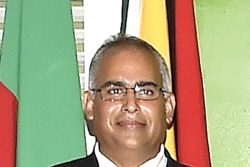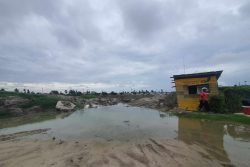In its manifesto for the 2020 general elections, the PPP/C promised that between 2020 and 2025 it would create 50,000 jobs.
Given the economic stagnation of the period with oil production only just having started this was as bold a promise that could have been made considering historic high unemployment and under-employment. Jobs are the hallmark of healthy economic expansion particularly those that are sustainable and enable families to make a decent living and to save.
With 2025 approaching, President Ali is fully aware that he and his party will be challenged on their pledge as is the norm for manifesto accountability in political campaigns. There had been statements over the last year by various government officials about the level of jobs that had been created but on April 30, in a pre-May Day address, the President made his boldest declaration yet on the matter which could probably be seen as the launch of campaigning for the 2025 elections but also a signal to the party’s congress this weekend.
In a Facebook address to the nation, President Ali said: “Keeping faithful to its manifesto promise, the government implemented numerous initiatives to rescue the productive sector. Today, all the key sectors are not only reporting higher output levels but have created countless jobs. If you look at the investment in housing, jobs that the government would have created directly is in excess of …. 65,000 jobs. When you add the jobs that have been created from government expenditure and investment and investment in the productive sector and the private sector safely in the last three and a half years we have been able to create more than 65,000 jobs across the country. This is in excess of the 50,000 new jobs we would have promised in the manifesto”.
No matter his role as Executive President of the country, President Ali would be well aware that as the lead utterer of this promise of 50,000 jobs he is not the one to proclaim its success or failure. He can certainly provide his own insight and offer up his figures but the determination of the actuality on the ground will have to be the task of a different process.
Second, there has undoubtedly been frenetic activity in various parts of the economy, particularly along the coast and in Region Three, mainly fuelled by the oil and gas sector and government’s massive investment in public infrastructure. What exactly that translates into in terms of permanent jobs is still to be determined. President Ali has blithely declared that these jobs are a done deal and that all the “key sectors” are reporting higher output and “have created countless jobs”. If these reports have come in they have probably only gone to the President as the public is unaware of such. We would urge President Ali to release all reports substantiating claims of job creation.
The recognised driver of economic growth in this country since 2019 has been ExxonMobil and its oil extraction. Even with massive capital outlays, the development of an extensive supply chain with its major contractors and offshore operations it can only account for 6,200 jobs for Guyanese since 2019. The government’s figure of over 50,000 jobs appears fanciful and simply plucked out of nowhere. The President cited investment in housing as one of the major generators of jobs. There is again no evidence in the public domain that construction in housing schemes has yielded thousands of jobs.
One of the employment initiatives of the government has been the so-called 10-day jobs where the government has hired several thousands on a part-time basis doing odd jobs. This was essentially an unemployment benefit. Those persons cannot be considered to be in full-time, sustainable employment and there should also be an audit of the usefulness of this programme and whether it should continue.
Government policies, concessions and investment in roads and other types of infrastructure have no doubt seen an expansion in private sector hirings. Again, to what extent is unknown. The Private Sector Commission should be in a position to report on job creation based on information submitted by its constituent bodies.
The claim of over 50,000 jobs in three plus years would no doubt be of great interest to the World Bank, the IMF and other multilateral financial institutions and presumably they will also evaluate the state of the economy and the question of employment. In its concluding statement in September last year following its Article IV visit, the IMF had briefly commented on unemployment thusly: “Although there was robust employment growth in the oil, services and construction sectors, the unemployment rate was 12.4 percent in 2022, and staff estimates show that the output gap remains negative.”
During his visit here in February this year, Deputy Managing Director of the International Monetary Fund, Kenji Okamura also referred to jobs in a manner that did not recognize the bonanza that the president has claimed.
“In addition, we discussed the authorities’ efforts to develop a large skilled labor force to ensure a balanced growth path with low inflation and opportunities for well-paying jobs throughout the country”, Mr Okamura said.
Ultimately, the question of how many jobs have been created by this government is a task for expert analysis. If the government wants a truly credible figure to be established it will avail to the public all of the reports it thinks are germane to the question at hand. That would intersect well with the press freedom statement on Wednesday by the US, the UK, Canada and the EU on the need for journalists here to have more access to data to adequately report on the environmental challenges facing the country.






